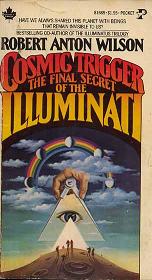
Cosmic Trigger: the Final Secret of the Illuminati
Robert Anton Wilson
287 pages including index
published in 1977
There are some books you should only read at age sixteen; if you first read them when you're younger, you won't understand them, while if you only encounter them much later, you'll think they're pretentious twaddle. You know the books I'm talking about, the ones that supposedly tell you how the world really works, or at least you think they do at the time. One classic example is Atlas Shrugged, which has managed to convince thousands of lonely, socially awkward nerds that they are the ubermenschen without whom the world would collapse.
I was luckier. My lifechanging book at sixteen was Robert Shea and Robert Anton Wilson's Illuminatus! Trilogy, which is a lot less harmful. Full of sex, crazy conspiracies, heavy drug use as the gateway to enlightement and the sort of anarchism that appeals to sixteen year olds. It was brilliant and it may not have really changed my life, but at least it took up the headspace which otherwise could've made me another teenage randroid.
It even made me believe, for at least a little while, in the magic and synchronicity in it, laws of five and all. Which in time led me to Robert Anson Wilson's solo book Cosmic Trigger: the Final Secret of the Illuminati, a sort of non-fiction counterpart to Illuminatus!. I first read it years ago, put it in a box somewhere and then forgot about it, until I came across it on Queensday and decided to reread it, as a sort of belated tribute to Robert Anton Wilson, who unfortunately died in January.
Cosmic Trigger is part autobiography, part history of the Discordians, but for the largest part the story of Wilson's attemps at engineering a brain change in himself, by opening himself up to succesive belief systems and using drugs like LSD and pot to make himself more receptive and less skeptical to strange ideas. He calls this proces entering the Chapel Perilous, which is supposedly at the hear of any magic belief system and which people like Aleister Crowley went through as well. One of the belief systems the book revolves around is that there are telepathic aliens around Sirius B which have been in ESP contact with Earth for thousands of years, but whose messages are only percieved by those open enough to them and who have now contacted him. Whether this is real or not is not important to Wilson's quest: the important thing is to make himself belief in it and see what this belief system does to him and his perception of the world.
The point Wilson tries to make is that reality isn't a singular undivisable truth, but instead is as much determined by your perception of things as by their actual existence. If you're immersed in a mystic belief system, you can see the world as magical, whereas when you're in a skeptical belief system, you see that magic is nonsense. The path to true enlightenment is to see that both realities --and more-- are equally valid.
Now I don't believe any of that new age hippy drippy crap. Yes, there is a case to be made for reality as the product of our beliefs and perceptations, but Wilson takes it too far. Magic isn't real, telepathic aliens from Sirius don't exist, period. But if there's anybody who could make me belief in this, it's Robert Anton Wilson, because he doesn't care about whether I belief in his experiences or not, he's just interested in telling me about them and letting me do with them what I want. What's more, he has a sense of humour about it all, which helps a lot.
Read more about:
Robert Anton Wilson,
Cosmic Trigger,
The Illuminati,
book review